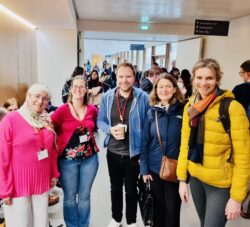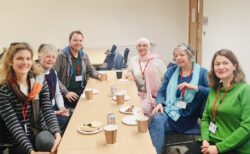AULC 2023 conference reflections: Languages for All in HE: Inclusion, Diversity, and Sustainability
By Caroline Campbell, Carolin Schneider, and Sascha Stollhans
The 24th annual conference of the Association of University Language Communities in the UK and Ireland (AULC) took place on 27-28 April 2023 and was hosted by the University of Edinburgh. This year’s theme was “Languages for All in Higher Education: Inclusion, Diversity, and Sustainability” - a theme that resonates a lot with the work that we are doing at Leeds, and therefore it’s probably no surprise that the conference was attended by a large group of colleagues from the School of Languages, Cultures and Societies and the Language Centre.

Ruba Khamam, Carolin Schneider, Sascha Stollhans, Nathalie Lawson and Kirsten Rathjen at the AULC Conference
The conference programme was exciting and rich in variety. Presentations and workshops discussed the latest practice innovations and research into language teaching and learning: topics ranged from Artificial Intelligence to decolonising languages, from interculturality and plurilingualism to learning spaces (including a hands-on workshop about the garden as a learning space), from staff development and collaboration to links between language degrees and institution-wide language programmes.
Highlights
Among the highlights were certainly the three fascinating keynotes:
Alison Hendry from the University of Edinburgh, the first British Sign Language (BSL) Development Officer in any Scottish Higher Education institution, spoke about Edinburgh’s British Sign Language policy and her experience of being a BSL user in Higher Education, both as a student and member of staff. “The BSL Plan at the University of Edinburgh was developed following the passing of the BSL (Scotland) Act in 2015, which places a responsibility on listed public bodies in Scotland to ensure that their services are more accessible for BSL users” (Iacobescu, 2023), and it was fascinating to get an insight into how the university has increased awareness of BSL as an independent language, including improved support offers for students and staff.
Of course, a lot of people were also very excited to meet Gerry, Alison’s hearing dog.
Following on from this talk, Carolin has started discussions with Leeds University Union (LUU) to develop the Language Zone’s resource offer, to build a British Sign Language collection and to work with LUU’s British Sign Language society to offer some interactives sessions for students to learn basic conversational and cultural signs and other workshops.
Alison Phipps (Glasgow), whom we were honoured to welcome to Leeds a few weeks ago as our Language at Leeds Distinguished Speaker, spoke to us about “Decolonising Hospitality through Languages”. Her presentation was the inaugural Dr Joy Northcott Memorial Lecture. Her talk was punctuated with multilingual poetic extracts delivered by UNESCO Artist in Residence, Tawona Sitholé. We were reminded that multilingualism is the norm in so many countries. Her final message was a description of geese - working together, leading, falling behind, resting, recovering, taking turns – and how we might usefully reflect on this.
On the final day, we had the pleasure to listen to Edinburgh’s Lauren Hall-Lew reflecting on “Social indexicality and its potential influence on language learning”. This included various questions including: how do we talk about specific languages? Within what discourses are individual languages discussed? What are our personal associations with languages? And how does all this impact on language learning and motivation?
For Carolin, this talk highlighted some important ideas around personal development of social meaning in language learning and links to motivation that align well with the Language Zone’s ideas and actions around creating a sense of belonging and some of the work the Language Zone team has led on around community building during the Covid-19 pandemic. Similarly, Carolin found the session “Talking Trees”, led by Dr Lan Lo, Assistant Professor in Chinese Language and Society at the University of Nottingham, very engaging. This session introduced a project entitled Talking Trees/树说/述说, which introduced stories around migration and settling down. She is hoping to return to exploring the links between the power of storytelling and language learning in future.
Recordings of the keynote speeches are available to watch on the Centre for Open Learning’s website.

Kirsten Rathjen, Caroline Campbell, Sascha Stollhans, Ruba Khaman, Amanda Deacon, and Nathalie Lawson enjoying a coffee break
University of Leeds staff contributions
Three LC/S colleagues (we hope we didn’t forget anyone – apologies if so) presented their work at the conference:
Caroline Campbell contributed to a workshop on scholarship organised by the Professional Development Special Interest Group. Caroline described her own scholarship journey at the University of Leeds, including opportunities offered by institutional perspectives but also being frank about potential barriers to scholarship. She rightly reminded us that scholarship is about exploring, reflecting, sharing and connecting, a theme very much running through the whole conference. She recognised that many staff at Leeds are fortunate to have a workload allocation for scholarship. She encouraged colleagues to make use of the wealth of opportunities offered by the AULC to present their ideas, to report on their pilot projects/action research in the classroom, to share their innovations in response to challenges, and to consider presenting at next year’s conference.
Ruba Khamam presented on “Joining the dots to create a model for integrating civic partnership and employability in a language curriculum”. She reported initial findings from her LITE project, which seeks to explore ways to embed employability effectively by means of integrating a civic curriculum in language teaching (with Arabic as a case study) and aligning that to the University's employability strategy and TEF rating criteria.
Sascha Stollhans co-presented a paper entitled “Collaboration and joined pedagogical research between Language Centres and academic language departments: flourishing developments or missed opportunities?” with Oranna Speicher from the University of Nottingham. Sascha and Oranna discussed initial results of a study exploring collaborations between staff teaching on language degree programmes and institution-wide language provisions, and the potential role of scholarship in further enabling collaborations. Read a recent blog by Sascha on scholarship at Leeds here.
At the conference a new special interest group (SIG) on language diversity, to be led by our Rasha Soliman, was also presented and formally approved. We also learned of the new AULC-UCFL SIG which seeks to support greater collaboration between institution-wide language provisions and degree programmes, and strengthen the status of language teaching HE in the UK, and the newly formed FLEUR association for teachers of French in Further and Higher Education.
Take-home messages
For us, the conference once again highlighted the value and importance of collaboration, networking, joint-up thinking, scholarship initiatives, inclusion and diversity (and underlined lots of connections to work being carried out at Leeds, which is very encouraging).
Take a look at the conference hashtag #AULC2023 on Twitter to find out more about the different papers and discussions.
We now very much look forward to next year's CercleS conference taking place in Durham!
